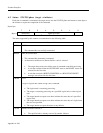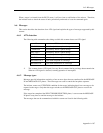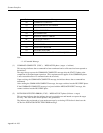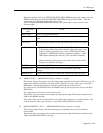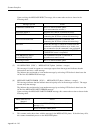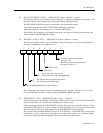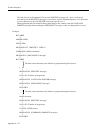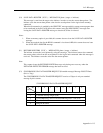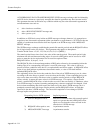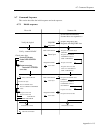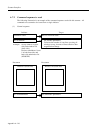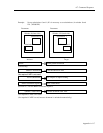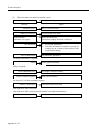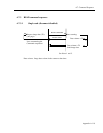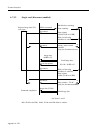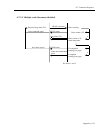
Scanner Interface
Appendix A-114
ASYNCHRONOUS DATA TRANSFER REQUEST (SDTR) message exchange shall be initiated by
an SCSI device whenever a previously arranged data transfer agreement may have become invalid.
The agreement becomes invalid after any condition which may leave the data transfer agreement in
an indeterminate state such as:
a) after a hard reset condition;
b) after a BUS DEVICE RESET message and;
c) after a power cycle.
In addition, an SCSI device may initiate an SDTR message exchange whenever it is appropriate to
negotiate a new data transfer agreement (either synchronous or asynchronous). SCSI device that are
capable of synchronous data transfers shall not respond to an SDTR message with a MESSAGE
REJECT message.
The SDTR message exchange establishes the permissible transfer periods and the REQ/ACK offsets
for all logical units on the two devices. This agreement only applies to data phases.
Transfer Period Factor: 62, 93, 125, 156 (4.0, 2.6, 2.0, 1.6 [MB/S] )
The transfer period factor times four is the value of the transfer period. The transfer period is the
minimum time allowed between leading edges of successive REQ pulses and of successive ACK
pulses to meet the device requirements for successful reception of data.
REQ/ACK Offset: 0 (Async), 1 to 8
The REQ/ACK offset is the maximum number of REQ pulses allowed to be outstanding before the
leading edge of its corresponding ACK pulse is received at the target. This value is chosen to
prevent overflow conditions in the device’s reception buffer and offset counter. A REQ/ACK offset
value of zero shall indicate asynchronous data transfer mode; a value of FFh shall indicate
unlimited REQ/ACK offset.
The originating device (the device that sends the first of the pair of SDTR message) sets its values
according to the rules above to permit it to receive data successfully. If the responding device can
also receive data successfully with those value (or smaller transfer periods or larger REQ/ACK
offsets or both), it returns the same values in its SDTR message. If it requires a larger transfer
period, a smaller REQ/ACK offset, or both in order to receive data successfully, it substitutes values
in its SDTR message as required, returning unchanged any value not required to be changed. Each
device when transmitting data shall respect the limits set by the other’s SDTR message, but it is
permitted to transfer data with larger transfer periods, smaller REQ/ACK offsets, or both than
specified in the other’s SDTR message. The successful completion of an exchange of SDTR
message implies an agreement as follows:
Responding Device SDTR response Implied Agreement
1) Non-zero REQ/ACK offset Each device transmits data with a transfer period
equal to or greater than and a REQ/ACK offset
equal to or less than the values received in the
other device’s SDTR message.
2) REQ/ACK offset equal to zero Asynchronous transfer
3) MESSAGE REJECT message Asynchronous transfer



